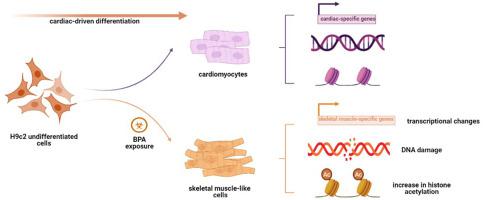Environmental Pollution ( IF 7.6 ) Pub Date : 2021-06-09 , DOI: 10.1016/j.envpol.2021.117567 Enrique Escarda-Castro 1 , María Paz Herráez 2 , Marta Lombó 3

|
Heart development requires a precise temporal regulation of gene expression in cardiomyoblasts. Therefore, the transcriptional changes in differentiating cells can lead to congenital heart diseases. Although the genetic mutations underlie most of these alterations, exposure to environmental contaminants, such as bisphenol A (BPA), has been recently considered as a risk factor as well. In this study we investigated the genotoxic and epigenotoxic effects of BPA throughout cardiomyocyte differentiation. H9c2 cells (rat myoblasts) were exposed to 10 and 30 μM BPA before and during the last two days of cardiac-driven differentiation. Then, we have analysed the phenotypic and molecular modifications (at transcriptional, genetic and epigenetic level). The results showed that treated myoblasts developed a skeletal muscle cell-like phenotype. The transcriptional changes induced by BPA in genes codifying proteins involved in heart differentiation and function depend on the window of exposure to BPA. Exposure before differentiation repressed the expression of heart transcription factors (Hand2 and Gata4), whereas exposure during differentiation reduced the expression of cardiac-specific genes (Tnnt2, Myom2, Sln, and Atp2a1). Additionally, significant effects were observed regarding DNA damage and histone acetylation levels after the two periods of BPA exposure: in cells exposed to the toxicant the percentage of DNA repair foci (formed by the co-localization of γH2AX and 53BP1) increased in a dose-dependent manner, whereas the treatment with the toxicant triggered a decrease in the epigenetic marks H3K9ac and H3K27ac. Our in vitro results reveal that BPA seriously interferes with the process of cardiomyocyte differentiation, which could be related to the reported in vivo effects of this toxicant on cardiogenesis.
中文翻译:

双酚A暴露对心肌细胞分化过程的影响
心脏发育需要对心肌细胞中的基因表达进行精确的时间调控。因此,分化细胞的转录变化可导致先天性心脏病。尽管基因突变是大多数这些改变的基础,但最近也认为暴露于环境污染物,如双酚 A (BPA) 也是一个风险因素。在这项研究中,我们研究了 BPA 在整个心肌细胞分化过程中的遗传毒性和表观遗传毒性作用。在心脏驱动分化的最后两天之前和期间,H9c2 细胞(大鼠成肌细胞)暴露于 10 和 30 μM BPA。然后,我们分析了表型和分子修饰(在转录、遗传和表观遗传水平)。结果表明,处理过的成肌细胞形成了骨骼肌细胞样表型。BPA 在编码参与心脏分化和功能的蛋白质的基因中诱导的转录变化取决于暴露于 BPA 的窗口。分化前的暴露抑制了心脏转录因子的表达(Hand2和Gata4),而分化期间的暴露降低了心脏特异性基因(Tnnt2、Myom2、Sln和Atp2a1)的表达。此外,在暴露于 BPA 的两个时期后,观察到关于 DNA 损伤和组蛋白乙酰化水平的显着影响:在暴露于毒物的细胞中,DNA 修复病灶(由 γH2AX 和 53BP1 的共定位形成)的百分比随剂量增加 -依赖方式,而用毒物治疗引发了表观遗传标记 H3K9ac 和 H3K27ac 的减少。我们的体外结果表明,BPA 严重干扰心肌细胞分化过程,这可能与报道的这种毒物对心脏发生的体内作用有关。











































 京公网安备 11010802027423号
京公网安备 11010802027423号